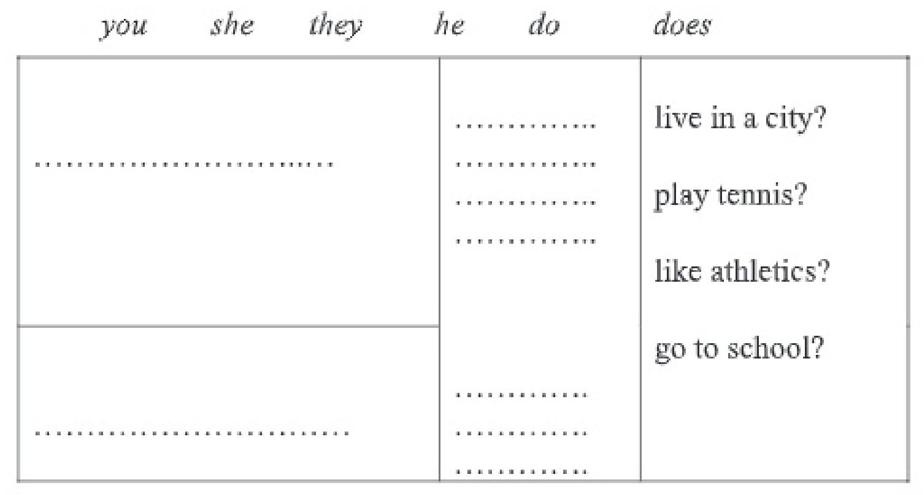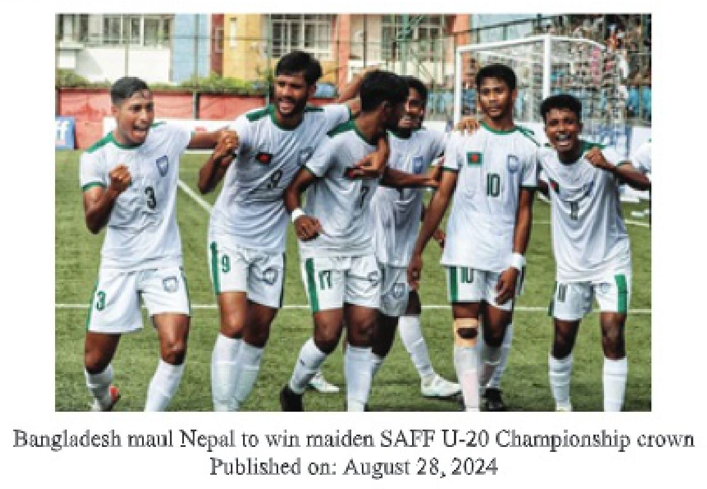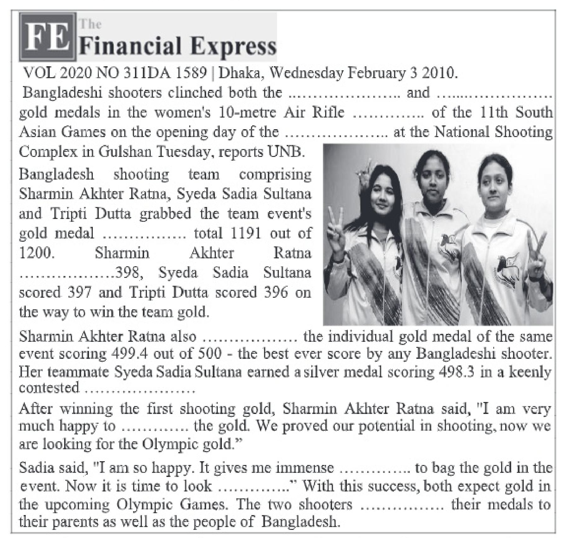
Learning outcomes
After we have studied this unit, we will be able to
Key words: striker coach half six school compound talk show quiz
A Look at the pictures. What are they about?

B Read the text. Write the day below each picture.
Every Thursday afternoon Ashish Biswash plays football. He is a striker. He plays for the local Friends Club. Do you want to know what else he does on other days? This is what Ashish says: "Friday and Saturday are my weekends. On Fridays. I go to my village home. Going home is really a wonderful experience. My mother waits for me there.
In the afternoon, I go cycling with my friends. Sometimes I go for a long walk. Next day I get up a little late. In the afternoon I play kabadi. In fact, I was a kabadi player during my school days.
From Sunday to Thursday I go to the club at 7 o'clock in the morning. It's the time for our regular practice. So I have to get up by 6 o'clock. Usually on Monday afternoon, the team doctor sees all the players. On Tuesday our coach shows us videos of important matches. We learn a lot from them. On Thursdays when we practise, our team manager watches our performance and keeps a record of that. Then he selects the team for the day. In the afternoon I go to the club at 1 o'clock. I spend some time with my teammates. At 4 o'clock our match begins. We regularly play with other local teams."
C Use the pictures in A to describe Ashish Biswas's week.
Example:
He plays kabadi on Saturday afternoon.
D Answer the following questions.
1 What's your favourite sport?
2 What's your favourite team?
3 Who is the captain?
4 Who is your favourite player?
5 How often do you go to the stadium and watch sports programmes?
| Listening text: 8 |
E Listen to the audio or your teacher and answer the following questions.
1 Who narrates the above story?
2 What is his dream?
3 Where does he live?
4 Why does he consider himself fortunate?
F Look at the chart. Listen to the teacher/CD again and write the time for each activity in the chart.
| Listening text: 8 |
| Activity | Time |
| get up | |
| go jogging | |
| have a shower | |
| get dressed for school | |
| go to school | |
| come home | |
| have some light food | |
| finish study | |
| go to bed |
G Does Arun do these things? Complete the sentences.
Example:
He gets up at 6 o'clock. He doesn't practise on Fridays.
H What do you think about Arun's life? Do you like him? Why/ why not?
Key words: practise weight lifter opportunity school compound
A Read the text below aloud.
Ashish and Arun are two players. I have known them for a long time. They are both very close to my family. Ashish is from a village. Arun lives in a small town. Ashish plays football. He doesn't play tennis. Arun practises cricket but he loves athletics as well. Arun goes to a local school. He has opportunities to practise in his school compound. Arun practises in his club field. Ashish has one brother. His name is Abir. He is a weight lifter. Arun has no brother. He has a sister. Her name is Apala. She doesn't like cricket. She is a swimmer.
B. Work in pairs. Make questions for Asish, Apala, Arun, and Abir using the table below. Then ask and answer the questions. Also ask these questions to your partner. Use the words in italics to complete the sentences.

C Change your partner. Ask and answer questions about his/her previous partner's sports habit and routine.
Example:
Does Emil play cricket?
Does he practise regularly?
D Do you remember Ashish Biswash, the footballer in the previous lesson? Here is an interview with him. Complete the questions. Use the verbs in the brackets.
Interviewer : Do you practise on Fridays and Saturdays?
Ashish : No, I don't. That's my weekend.
Interviewer : What …………………………. on Fridays? (do)
Ashish : I go to my village home.
Interviewer : …………………………. anyone …………………………. there now? (live)
Ashish : Yes, my mum lives there. She waits for me.
Interviewer : What …………………………. she do there? (do)
Ashish : She is a social worker.
Interviewer : When ............. practice everyday? (start)
Ashish : I start practising at 7 from Sunday to Thursday.
Interviewer : How …………………………. your free time? (spend)
Ashish : I play kabadi, go cycling, or take long walks with my friends. Sometimes I chat with my mum.
Interviewer : When …………………………. back from your village? (come)
Ashish : On Saturday evening.
E Make a few more questions and answers for this interview. Work with a partner. Act out the interview.
F Choose a sports star. Make six questions to ask him/her. Use the words in the box below. Then act out the interview with a partner.
G Make a personal fact file to talk about a day in your life. Answer the questions.
1 What time do you get up?
2 What do you have for breakfast?
3 How do you get to school?
4 What games or sports do you play? Why?
5 Who is your favourite sports star?
6 When do you go home from school?
7 Do you go home at the same time everyday?
8 What is the first thing you do when you get back home?
9 How long do you watch television each day?
10 What's your favourite programme?
11 How often do you go out with your friends?
12 Where do you go? What do you do together?
13 What time do you go to bed?
14 What is your dream for the future?
H Work in pairs. Ask and answer the above questions. Keep a record of your partner's answers and write a paragraph about him or her on the basis of your record. Start like this ……..
Moon (partner's name) gets up at 7 o'clock in the morning. Then she has breakfast. She eats two pieces of chapati and a portion of vegetables. Sometimes she eats a banana and drinks a glass of milk. She …………..
Key words: aerobics yoga jogging middle-aged

A Talk about these questions.
1 Do you know what games and sports these are?
2 Do men and women in our country enjoy any of these games or sports?
3 Do you enjoy any of these or other games and sports? Which one/s?
4 Which of the above sports are commonly practised by women in your locality? Which ones are practised by men?
B Work in pairs. Which of these activities are popular with the following age groups? Tick (V) the activities. Then compare with your partner and make sentences.
(There can be more than one activity for each group.)
| children | teens | young adults | middle-aged people | older people |
| aerobics |
|
|
|
|
|
| baseball |
|
|
|
|
|
| bicycling |
|
|
|
|
|
| football |
|
|
|
|
|
| swimming |
|
|
|
|
|
| tennis |
|
|
|
|
|
| yoga |
|
|
|
|
|
| jogging |
|
|
|
|
|
Examples:
A: I think aerobics is popular with teens.
B: And with young adults too.
C Pairwork. Take turns asking the questions in part A of the above exercise. Give your own information while answering.
D Listen to the statements and notice how the bold part of a word is pronounced.
I hardly 'ever go for a walk in the 'morning.
I often go 'swimming on 'Fridays.
I 'seldom do 'yoga.
E Work in pairs. Take turns to say about your exercise habits using a word given in Section D.
Key words: stout attractive boring energetic manly entertaining interesting smashing successful sober dependable unattractive slim smart
A Look at the pictures. Who are they? What are these people famous for?

B Read the following words. Use them to describe each person above.
| stout, attractive, energetic, strong, young, middle-aged, old, manly, entertaining, interesting, smashing, successful, great, sober, slim, smart |
C Some of the words in the box above have opposite meanings. Work in pairs and write the opposite words against them. The first one is done for you.
stout slim
D Read the text on the great Brazilian footballer, Pelé.
Pelé is widely regarded as one of the greatest football players of all time. In 1999, he was voted Football Player of the Century by the IFFHS. IFFHS stands for International Federation of Football History and Statistics.
In 1999 the International Olympic Committee (IOC) named Pelé the "Athlete of the Century". In his career he scored more than 1200 goals. Thus he has become the top scorer of all time. In his own country, Brazil, Pelé is a national hero. People call him "The King of Football", "The King Pelé" or simply "The King". He is the all-time leading scorer of the Brazilian national team. He is the only footballer to be a part of three World Cup winning squads and the only player in the world to have three World Cup winning medals.
E True or false? If false, give the correct information.
1 In 1999 Pele was voted Football Player of the Century by IOC.
2 In the same year, Pele was honoured as the Athlete of the century.
3 He is one of the top scorers in the football world with more than one thousand goals.
4 Pele is an international hero in his country.
5 He is one of the football players with three World Cup winning medals.
F Now read about Maradona, another world-famous player, completing the text with the right form of verbs given in the box. You may use a word more than once.
| prove | play | become | vote | win | be | captain | spend |
Diego Armando Maradona was born in a poor family and ……………… his childhood in a slum. However he ……….. his football talent at the age of ten only. Now he ………………….. considered the greatest football player of all time. He ………………. the FIFA Player of the Century too. He …………….. in four FIFA World Cup tournaments in 1982, 1986, 1990 and 1994. In 1986, he ………………. Argentina and ……………….. the World Cup. He ……………….. the tournament's best player in 1986 and won the Golden Ball. His second goal with England in 1986 was ……………. the Goal of the century. In that match, he dribbled through six English players to cross 60 metres (66 yards). He also ……………. the Golden Ball at the FIFA under 20 World Cup in 1979. In 1990, Argentina …………… the runner up in the World Cup under his captaincy too. This is why Maradona ………….. a legend not only in Argentina but also in the whole world.
Key words: amazing individual grab dedicate
A. Read the following article published in The Kathmandu Post about the historic win of Bangladesh in SAFF U-20 Championship football tournament.

Bangladesh wrote a new chapter in South Asian football history on Wednesday as they defeated hosts Nepal 4-1 in the final at the ANFA Complex in Lalitpur to win their maiden SAFF U-20 Championship title.
Mirajul Islam scored a brace, Rabby Hossen Rahul added the third and Piash Ahmmed Nova rounded off a ruthless victory with their fourth goal as the Bengal Tigers finally got hands on the trophy nine years after the inception of the championship.
Backed by home support, and with defending champions India already out of the competition, Nepal started as strong favourites having also beaten the Tigers 2-1 in the group stage and were looking to reclaim the throne.
But Urjan Shrestha's side were so wasteful and took too lightly a Bangladeshi team that had undone India in the semi-finals.
Nirajan Dhami was the biggest threat to Bangladesh in the first half, constantly bullying the opponents' post with his long rangers.
Bangladesh scored their first goal in the injury time of the first half with a clinical freekick from Mirajul, whose shot from just outside the edge of the box hit the upright before finding the net.
The lead injected so much energy into Bangladesh that they were all over Nepal after the restart.
Although Nepal pressed for equaliser immediately, it was Bangladesh who proved to be a better team with their second goal in the 55th minute thanks to Mirajul. Mirajul scored four goals to top the goal-scoring tally in the championship.
The two-goal deficit soaked all the life out of Nepal and Bangladesh took full advantage of it, adding another goal in the 71st minute scored by Rahul.
Samir Tamang gave some hopes of a fight back, reducing the deficit in the 80th minute with a free header.
Nova then put the final nail in the coffin, sending the ball through the legs of Shekh in the sixth minute of stoppage time.
Mirajul was declared the most valuable player of the tournament, while Asif won the best goalkeeper award.
Nepal received the fair play award.
Bangladesh U-20 team coach AKM Maruful Haque dedicated the trophy to "the heroes and their souls who sacrificed their lives for the sake of a new Bangladesh."
"I hope this championship will inspire the nation to reform Bangladesh," he added.
[Abridged]
B. Find the meanings of the underlined words and phrases from the article using a dictionary or the internet. Match the words/phrases in the left column with their meanings in the right column.
| a. to change or improve something |
| b. the beginning |
| c. a goal that levels the score |
| d. lack or shortage |
| e. a final blow |
| f. to hurt badly |
| g. efficient and effective |
| h. defeated |
| i. extra time |
| j. scored two goals |
| k. added or introduced |
| l. harming or scaring someone |
| m. without mercy or pity |
| n. following the rules and being honest |
C. Answer the following questions in pairs.
D. Write a paragraph on the best football match you have played or watched. Share your work with a partner and ask them to correct any mistakes.
D Read and listen to the teacher/ CD. As you listen, fill in the gaps in the text with the right words.
| Listening text: 9 |

E Suppose you are going to take an interview of the golden girls of Bangladesh. What questions will you ask them?
1 ………………………………………………………………………………………………………………………
2 ………………………………………………………………………………………………………………………
3 ………………………………………………………………………………………………………………………
4 ………………………………………………………………………………………………………………………
5 ………………………………………………………………………………………………………………………
common.read_more